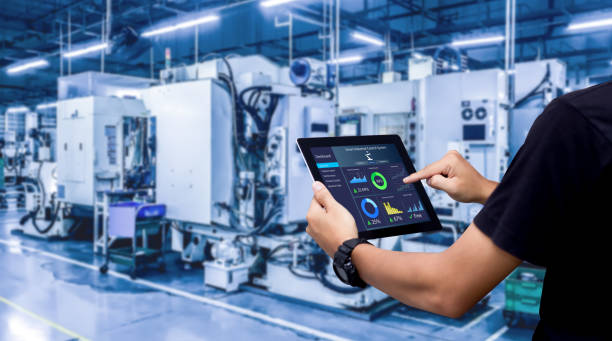AI & Industry 4.0: Shaping the Future of Manufacturing
- Posted by Shruti Verma
- Categories Blog, College, Corporate, Individual, Trainers
- Date June 18, 2024

Introduction
The integration of Artificial Intelligence (AI) with Industry 4.0 represents a pivotal advancement in the manufacturing and industrial sectors, Smart factories. Industry 4.0, often termed the fourth industrial revolution, converges cutting-edge technologies such as cyber-physical systems, the Internet of Things (IoT), cloud computing, and cognitive computing. These innovations bridge the physical and digital realms. It creates interconnected systems that enhance efficiency, productivity, and adaptability in manufacturing processes.
Understanding Industry 4.0
Defining Industry 4.0
At its core, Industry 4.0 aims to revolutionize traditional manufacturing processes by optimizing operational efficiency, improving product quality, and increasing flexibility. By leveraging cyber-physical systems, factories can achieve real-time data collection and processing. This capability facilitates predictive analytics and prescriptive insights, enabling manufacturers to anticipate demand, optimize inventory management, and streamline production schedules.
Goals of Industry 4.0
Central to Industry 4.0’s transformative impact is the Internet of Things (IoT), which facilitates seamless communication between devices and machines. IoT-enabled sensors and actuators gather vast amounts of data, providing critical insights for decision-making. Cloud computing complements this by offering scalable resources for data storage and analysis, enabling manufacturers to harness big data analytics to drive continuous improvement across their operations.
The Role of AI in Industry 4.0
Enhancing Decision-Making
The role of AI within Industry 4.0 is particularly significant, enhancing decision-making processes through advanced data analysis and machine learning algorithms. AI algorithms can detect patterns, predict outcomes, and recommend optimal actions in real-time, thereby optimizing production processes and enhancing overall efficiency.
Optimizing Production Processes
Predictive maintenance, enabled by AI, stands out as a game-changer, allowing manufacturers to schedule maintenance based on machine data, thereby reducing downtime and operational costs.
Enabling Predictive Maintenance
AI-driven systems also foster human-machine collaboration, augmenting human capabilities in manufacturing environments. Technologies such as augmented reality (AR) provide real-time information and guidance to workers, improving accuracy and efficiency in complex tasks. Collaborative robots (cobots), equipped with AI, handle repetitive or hazardous tasks, freeing human workers to focus on higher-level responsibilities and innovation.
Case Studies: AI and Industry 4.0 in Action
Siemens: Smart Factory
Several industry leaders exemplify the transformative potential of AI and Industry 4.0. Siemens’ Amberg Electronics Plant, for instance, utilizes over 1,000 IoT devices to optimize production processes through AI-driven data analysis. This approach has resulted in a significant increase in operational efficiency, with a near-perfect quality rate and a substantial reduction in unscheduled downtime.
General Electric (GE): Predictive Maintenance
Similarly, General Electric (GE) employs AI for predictive maintenance through its Predix platform, leading to notable reductions in unplanned downtime and improved operational efficiency for its customers.
Bosch: Automated Quality Control
Bosch employs AI-powered vision systems for quality control. These systems analyze product images in real-time, detecting defects and anomalies with high accuracy. This approach has significantly reduced defective products and improved overall product quality.
Challenges and Considerations
Data Security and Privacy
Despite its promise, the adoption of AI and Industry 4.0 technologies is not without challenges. Data security and privacy concerns loom large, necessitating robust cybersecurity measures to safeguard sensitive information from cyber threats.
Integration Complexity
Integrating these advanced technologies with existing manufacturing systems also poses complexities, requiring standardized protocols and frameworks to ensure seamless interoperability and communication.
Skill Gaps
Addressing the skill gap is another critical consideration, as the widespread adoption of AI and Industry 4.0 necessitates a workforce equipped with advanced technical competencies. Investing in training and upskilling programs is essential to empower employees and maximize the benefits of these technologies effectively.
Ethical Considerations
Moreover, ethical considerations regarding job displacement, decision-making transparency, and societal impacts require thoughtful deliberation. Establishing ethical guidelines and frameworks can ensure responsible AI deployment, mitigating potential risks and promoting sustainable growth.
The Future of AI and Industry 4.0
Edge Computing
Looking ahead, the future of AI and Industry 4.0 promises further innovations and advancements. Edge computing will enhance real-time decision-making by processing data closer to its source, while advanced robotics will create more intelligent and versatile systems capable of complex tasks.
Advanced Robotics
Advanced robotics, integrated with AI, will create more intelligent and versatile systems capable of performing complex tasks with precision and adaptability.
Digital Twins
Digital twins will simulate and optimize manufacturing scenarios, enabling data-driven decisions and improved operational efficiency.
Autonomous Systems
AI-powered autonomous systems will perform tasks such as quality inspection and material handling with minimal human intervention, enhancing efficiency and reducing errors.
Enhanced Supply Chain Management
AI and Industry 4.0 will transform supply chain management by providing real-time visibility, predictive analytics, and automated decision-making, leading to more efficient and resilient supply chains.
Sustainable Manufacturing
AI and Industry 4.0 will drive sustainable manufacturing by optimizing resource utilization, reducing waste, and minimizing environmental impact. AI can identify energy-saving opportunities and support eco-friendly product development.
Human-Centric AI
Future AI and Industry 4.0 will focus on human-centric AI, enhancing human capabilities and work experience through personalized training, intelligent assistance, and improved workplace safety.
Conclusion
In conclusion, the synergy between AI and Industry 4.0 is reshaping manufacturing into intelligent, interconnected ecosystems. By leveraging AI for data-driven insights, predictive maintenance, and enhanced collaboration, smart factories are poised to achieve unprecedented levels of efficiency, sustainability, and innovation. Addressing challenges through strategic measures will be crucial in realizing this transformative potential and ensuring a future where technology enhances human well-being and industrial resilience.
About the Author: Shruti Verma is Skill Advisor at IDI Institute de Informatica. Learning for career is an Initiative of IDI that conducts courses in futuristic technologies with an aim to build SMART professionals where SMART is being Skilled, Motivated, Analytical, Resourceful and Transform people.
https://www.facebook.com/learningforcareer01
.
You may also like
AI Career Explosion: 50 Top Jobs Awaiting You
In the ever-evolving world of technology, Generative AI stands out as one of the most groundbreaking advancements.
Edge Computing: A Revolution at the Network’s Frontier
In the ever-evolving world of technology, Generative AI stands out as one of the most groundbreaking advancements.
From GPT-1 to GPT-4: The AI Language Revolution
In the ever-evolving world of technology, Generative AI stands out as one of the most groundbreaking advancements.

